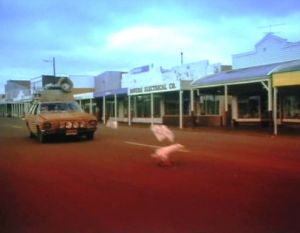I ‘m in the final stretch of RBT and I feel like Quint waiting in the water to board the rescue ship. Viewing the series has often been torturous (but never tortuous; also, no tortoises); having the end in sight should be a relief but is causing some anxiety — like I’ll get to the last episode and someone will discover another season of lost episodes in their attic.
‘m in the final stretch of RBT and I feel like Quint waiting in the water to board the rescue ship. Viewing the series has often been torturous (but never tortuous; also, no tortoises); having the end in sight should be a relief but is causing some anxiety — like I’ll get to the last episode and someone will discover another season of lost episodes in their attic.
This episode does, at least, get off to a promising start as we see the always amusing but criminally under-used Michael J. Pollard. He is the soul-proprietor [1] of a mortuary and small graveyard. He is ringing the chapel-bell [2] and turns it up to 13 only to be busted by a kid outside who also has too much time on his hands.
Later that day, he shakes hands with a yokel who says he has a cold hand, must have just embalmed a frigid woman. So he imagines the man dead. A clerk in a store hassles him to speak up, so he imagines her dead. Six minutes in, I’m imagining me dead.
 Back at work, he puts on Toccata and Fugue in D Minor and starts talking to his clients. Pollard enjoys punking them before they are buried. He bakes a gluttonous fat woman into a cake. He injects black ink into the body of a racist. He removes the head from a muscular man so he can have his head sewn onto it someday. It’s not clear if that is intended to be a joke.
Back at work, he puts on Toccata and Fugue in D Minor and starts talking to his clients. Pollard enjoys punking them before they are buried. He bakes a gluttonous fat woman into a cake. He injects black ink into the body of a racist. He removes the head from a muscular man so he can have his head sewn onto it someday. It’s not clear if that is intended to be a joke.
One of the stiffs turns out to have been merely pining for the fjords. Because he heard Pollards confessions, he is killed. That night — which is dark, as nights are wont to be, and stormy — shadowy figures come for Pollard.
The next morning, one of the yokels discovers blood on a tombstone and asks, “What kind of storm was that last night?” Spoken without any humor or irony, it is just another example of why Bradbury should have outsourced the screenplays. Pollard’s name is also scrawled on all of the tombstones in his cemetery. One of the yokels makes the profoundly stupid statement, “He couldn’t possibly be buried under all these tombstones.”
I get that Bradbury was great stylist of the prose in a short story, but the man had a George Lucasian grasp of dialogue. I keep telling myself that he was born in a different time, and wondering if maybe the small town America he grew up in was really accurately reflected in his stories.
Post-Post:
- [1] Once again, I must say it is gott-damn impossible to come up with anything original.
- [2] Go-ing to the chapel, and we’re going to get bu-uh-uh-uried. I’m not even Googling that one.




















